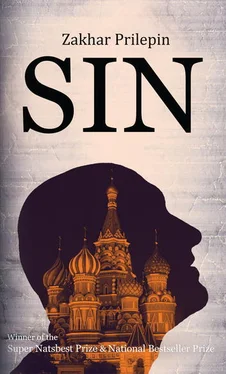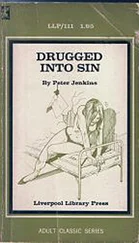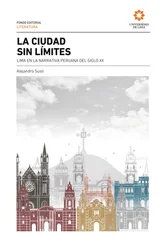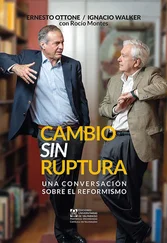Soon after that, two weeks later, my money ran out, and I had no means of paying for the empty room I was renting, with a wonderful hard bed and two dumbbells under it, and almost nothing to feed myself with. But like any happy person, a way out of the situation found me itself, hailing me during a daily walk that was almost as long as noon.
When I heard my name, I turned around with a light heart, always prepared for everything, but at the same time not expecting anything from life but good things.
His name was Alexei.
We had once been introduced by my strange girlfriend, who embroidered pictures, I don’t remember what these creations are actually called. She gave some pictures to me, and I immediately hid them in a shoebox, sincerely thinking that sewing on epaulets was much harder.
I took the box along with me. Along with the dumbbells, it was my most prized possession. Two or three semi-literate letters from comrades from my barracks past lay in the box, and a bundle of tender and heart-wrenching letters from my brother, who was in prison for committing ten, or maybe twelve, robberies.
Next to the box, there was a volume with three novels by a great Russian émigré, a soldier in the Volunteers Army, and French taxi-driver. Reading his novels, I felt in my heart that clear and warm bitterness, almost incomprehensible to me, that spread out into a smile even as I was about to hit someone.
There was also an exercise book, in which sometimes, not more than once a week, but usually much more rarely, I sometimes wrote down rhymed lines, surprising myself. They came to me easily, but inside I realized that I didn’t feel anything that I described, and had never felt it. Sometimes I reread what I had written and was surprised again: where did that come from?
I never even looked at my girlfriend’s embroidered pictures.
Then she had an exhibition, and it turned out to be a lot more than epaulets, and she asked for the pictures back, but I had lost them, of course — I had to make up some lie.
But I went to the exhibition, and for some reason she introduced me to Alexei, although I didn’t express any desire to be introduced to him, or to anyone at all.
At first glance, he made a strange impression. He was morbidly fat, with traces of teenage acne that had not healed. The features of his face were blurred, as though they had been drawn on wet paper.
But Alexei turned out to be a friendly sort of person, and immediately suggested that we drink at his expense somewhere nearby, and so I didn’t really get a proper look at the exhibition.
For some reason, he was the person who happened to have been pushed out into the springtime street to hail me when I had run out of money, and he loudly spoke my name.
We said hello, and he immediately squatted down to do up his shoelace. I pensively looked at the top of his head with its sparse, sweaty thin hairs — like children have, when they are almost newborn.
His head was large and round.
Then he got up, and I didn’t even think of starting the conversation, but he easily started talking, he simply caught some word in the air, whatever one was closest of all, perhaps the word was asphalt , perhaps it was shoelace , and he followed it, and kept on talking. It was all the same to him what shoelace to begin with.
Without thinking it over, I agreed once more to drink at his expense.
After we drank half a bottle of vodka, and I had listened to everything that he said for about half an hour, I finally pronounced one phrase. It was simple: “Me? I live well; I just don’t have a job.”
He immediately offered me a job. In the same place where he worked.
We quickly became friends, I don’t know what he needed me for. But he didn’t depress me, didn’t irritate me and even cheered me up sometimes. He liked to talk, and I didn’t mind listening. Strange things were constantly happening to him — he was always falling asleep drunk in stairwells, night trains and public squares, and would wake up to find he had been robbed or beaten up, or was in the drunk tank, where he had also been robbed.
He had a gentle and quite tactful sense of humor. Sometimes his ideas about life turned into colorful aphorisms. When he was sober, he moved quickly, but only over short distances — to the smoking area, say. He smoked a lot, he liked baggy shirts, his shoes were always dusty, and always had laces.
I addressed him tenderly: Alyosha. He was just over thirty, he had graduated from the Literature Institute and had served in the army, where, in some way unfathomable to me, he had not been killed.
Our work wasn’t hard. We were reinforcement workers in one of those worthless offices that have become so numerous in our strange times. They were born and died almost painlessly, although sometimes they left without pay those yawning workers who had failed to sense the approaching collapse.
In the evenings, when the workday was coming to an end, he would quietly approach me, and lean over, whispering:
“I feel sad, Zakhar. How about drinking some vodka?”
We would wander out of the office, already feeling the tender anxiety of approaching alcoholic intoxication, and that made us start talking louder, taking delight in incidental trifles.
He talked almost all of the time, I only interjected occasionally, not more than a dozen words in a row; and if what I said made him laugh, this made me happy for some reason. I didn’t ask a lot from our friendship, I was used to being satisfied with what I had.
As we approaching the kiosk, Alyosha started speaking more quietly: as if he were afraid that someone would catch him buying vodka. If I didn’t follow Alyosha’s example of quieting down by the kiosk, and kept acting the fool, he would hush me. I would shut my mouth, staying happy on the inside. I have a strange habit of sometimes obeying good, kind, weak people.
We pitched in together to buy the vodka, usually equally — but Alyosha never trusted me to buy anything, he took the money from me and pushed me away from the window of the kiosk with a look that said unless he did everything himself, I would be sure to get confused and buy a box of candy instead.
He bought a bottle of vodka, a dark yellow bottle of lemonade and two plastic cups. Alyosha didn’t believe in snacks. Afterwards — so he thought — the money left over would probably come in handy, when everything had been drunk and of course it wouldn’t seem to be enough.
We would go into a quiet, neglected yard. In the corner of the yard there was an old bench — to the right of it there was a crooked old yellow building, and on the left there was a row of damp, rotting barns, where we went to urinate once we’d drunk the vodka.
As we approached the bench, he would say with relief: “Well, here we are…” In the sense that everything had worked out fine, despite my clumsy, noisy behavior, and annoying advice about buying at least something to chew on.
He always put the vodka away in his bag, and poured it out when he thought necessary.
We threw the rubbish off the bench, laid out sheets of newspapers, and joked quietly. The jokes already sounded in a different register: the throat quieted down as if it was saving itself for the burn that was soon to come, and did not effervesce so loudly and cheerfully.
We lit cigarettes, and sat for a while in silence, looking at the smoke.
Then Alyosha poured out some vodka, and I sat with my head inclined, watching the gentle flow of the clear liquid.
After the first shot, he would start coughing, and coughed for a long time, with a look of unusual disgust. I chewed on the stem of a fallen leaf, good-naturedly cursing myself for not taking a little money from Alyosha to buy myself some food.
From time to time, out of the crooked yellow building, young people would come out, hunched over, with stupid faces, wearing leggings rolled up to the knees and flip-flops; they talked loudly, tirelessly swearing and spitting on the ground.
Читать дальше












